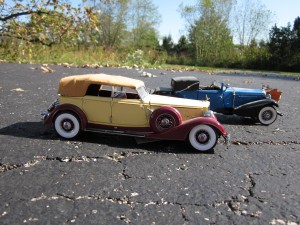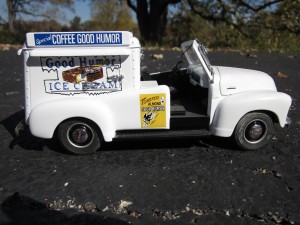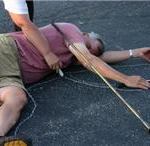On December 18th, with great sadness and some relief, I was officially booted out of the sandwich generation. My mother had died a year and half earlier, but her death did not change my every day life that much. She had really been in her own world for the previous three years or so, so my energies had really focused on my father. And now with his death, the great unraveling was complete, and I was in a new phase of life – before I sandwich up my children. Perhaps I am part of the open-face sandwich generation.
It was strange to be back in the same church again, with the same cast and crew, but this time everything seemed more final, and we were honoring an entire generation that was slipping away. We had learned a few things from the first go-around, and had elected to do a direct cremation and bypass the unnecessary totus porkus funeral home. I went to pick up the ashes and found the modest facility in the strip mall by the bowling alley. The woman was odd looking and pear shaped, wearing a lumpy sweat shirt and large oversized glasses. Before she handed me the two tin containers, she gave me an American flag and in a solemn voice read from a sheet thanking my father for his service to his country. I asked her who was giving me a flag and she said, “the President of the United States and a grateful nation.” It would be easy to snicker at this hokey ceremony in a poorly lit room with a bad shag carpet, but I was unexpectedly moved by this minor gesture – it seemed like something that the US government actually got right.
The last several months have been devoted to unraveling my parents’ possessions and clearing out the house that they had lived in for over 50 years. When realtors first came in to assess the house’s potential, they all sighed and commented that this was going to be a huge job – certainly we would get bogged down by reading old letters, perhaps discovering some deep dark secrets, or divvying up their possessions. However, as we delved into the project, I realized that it would be easy. My parents were simply not collectors and left no trace of their secrets. There were few possessions of any great value, which were easily shared among my siblings. I had secretly hoped that one of my siblings would put their  sticker on my childhood portrait, but it was unclaimed at the end of our great divide, so I took it home with me. I wandered around the house trying to find a suitable spot for me, but felt self conscious putting it anywhere prominent. I walked by the powder room and thought, “Perfect.” So there I hang, cute as a bug’s ear in my blue smocked dress providing a cheerful greeting whenever nature calls.
sticker on my childhood portrait, but it was unclaimed at the end of our great divide, so I took it home with me. I wandered around the house trying to find a suitable spot for me, but felt self conscious putting it anywhere prominent. I walked by the powder room and thought, “Perfect.” So there I hang, cute as a bug’s ear in my blue smocked dress providing a cheerful greeting whenever nature calls.
The most sentimental things my mother collected were expressions about the importance of smiling and laughter. Some of these aphorisms were found on the inside of the Dove candies, and I found some crumpled up candy wrappers taped to the inside of a cupboard. On another wall, she had taped all sorts of newspaper clippings that included her name Fanny and my father’s name Ralph. My mother liked to poke fun at her old-fashioned name. In recognition of her double-entendre name she chose “Bum” as her grandmother name. Socially, she went by the name Fan, and would often introduce herself as, “I’m Fan, like an athletic supporter.” My father Ralph, on the other hand, did not seem to appreciate the fact that his name had evolved to an idiom for vomiting. For one anniversary party, I concocted a family game of Jeopardy of various family trivia. I had squares for daily doubles where the group was challenged to come up with the most unique idioms for Fanny and Ralph. Fanny was no problem – rear end, butt, ass, heinie, cheeks, glutes, buns etc. But my father seemed dumbfounded as we spewed forth Ralphisms such as “hug the porcelain throne” (from my college years), “york the pork” and “splash the hash” (from my mother’s college years), and “release the hostages” (from the Iran hostage crisis). After this experience my mother started collecting advertisements and sayings that included the word “Ralph.” No longer was Ralph associated with great intellects like Ralph Waldo Emerson, in fact the general tenor of these ads was that Ralph was a doofus name.
But my father held his head high and went about his own collecting – models of antique cars. When we were younger, he actually owned a few antique cars, which, based on family movies, seemed to be the perfect vehicle to pull toboggans around our circular driveway. My father never thought to treat himself to anything, with the exception of antique car models and magazines. They overflowed shelves in his bedroom, family room and office, there were probably several hundred of them. While his cognitive abilities faded towards the end of his life, he was absolutely spot on when it came to his cars. I could pull any car off the shelf and ask him, “What kind of car is this Dad?” He would hold it in his trembly hand and in an equally trembly voice pronounce, “1937 Model T Ford.” I would turn over the car, and he would be absolutely correct, even though he might be a bit vague on my name.
there were probably several hundred of them. While his cognitive abilities faded towards the end of his life, he was absolutely spot on when it came to his cars. I could pull any car off the shelf and ask him, “What kind of car is this Dad?” He would hold it in his trembly hand and in an equally trembly voice pronounce, “1937 Model T Ford.” I would turn over the car, and he would be absolutely correct, even though he might be a bit vague on my name.
So this was the biggest challenge – what to do with all the cars. Each of us took 10 cars for a starter, which barely seemed to make a dent in the collection. Then we took 5 more, and more, and then a nephew arrived and gratefully took the rest to display in his garden shop in California. I had just scooped up a bunch of cars, and only later when I got them home, I realized that I had acquired an anatomically correct Good Humor ice cream truck, including tiny latches on the freezer compartments, and the little bells on the windshield.
 Of all the cars, this was probably the only one that I had any direct connection to. Don Dumont was the name of the local Good Humor man. I don’t know what he did all winter, but every summer he would reappear wearing a cap that said he was running for president in addition to selling Good Humors. In our household, Good Humor bars were the height of indulgence and only rarely would we get such a treat. I was well aware that I had a very privileged life, but I lived in a community where you could always find someone who had a little bit more – like a Good Humor man who made housecalls. Standing outside, I would hear the tinkle of the ice cream truck and the crunch of gravel as Don Dumont arrived at our next door neighbor’s house and I watched Mrs. Reed take boxes and boxes into her basement. Of course the Reeds were unfailingly generous, and I could have waltzed right over there to get a Good Humor anytime, but the irony was they always got the inferior flavors of toasted almond and strawberry shortcake and not the chocolate fudge cake that I preferred. Out of all the cars that my father could have purchased, why he had chosen to get a Good Humor truck. It wasn’t really even an antique. It did seem odd unless of course we secretly appreciated the same symbolism…
Of all the cars, this was probably the only one that I had any direct connection to. Don Dumont was the name of the local Good Humor man. I don’t know what he did all winter, but every summer he would reappear wearing a cap that said he was running for president in addition to selling Good Humors. In our household, Good Humor bars were the height of indulgence and only rarely would we get such a treat. I was well aware that I had a very privileged life, but I lived in a community where you could always find someone who had a little bit more – like a Good Humor man who made housecalls. Standing outside, I would hear the tinkle of the ice cream truck and the crunch of gravel as Don Dumont arrived at our next door neighbor’s house and I watched Mrs. Reed take boxes and boxes into her basement. Of course the Reeds were unfailingly generous, and I could have waltzed right over there to get a Good Humor anytime, but the irony was they always got the inferior flavors of toasted almond and strawberry shortcake and not the chocolate fudge cake that I preferred. Out of all the cars that my father could have purchased, why he had chosen to get a Good Humor truck. It wasn’t really even an antique. It did seem odd unless of course we secretly appreciated the same symbolism…
Then of course there were the pictures. Some were of grandparents and great grandparents stored in boxes, where they had been since my parents had gone through the same rite of passage with my grandparents. I pondered on what to do with these. I had no direct connection with many of these ancestors but felt a little guilty about just throwing them out. Around the same time I happened to stay in a bed and breakfast where the owner had spared no detail in recreating a Victorian ambience. As I was sitting eating breakfast, I asked who were the portraits were of – one a man with a stiff collar and a large bushy moustache, and the other a woman with an impossibly cinched waist and a huge theatrical hair do with combs and a bun. They looked similar to the portraits currently lined up in my front hall. The owner said, “Oh I have no idea, I just picked them up at an antique fair.” It suddenly seemed too cruel to consign my ancestors to either the dustbin or to an anonymous contrived tchotchke. At the same time, I saw an ad on TV about a website called ancestor.com which claimed it could help people reclaim their roots. The ads featured people delighting in finding the slightest evidence of their forebearers. And here I was with a huge collection at my finger tips. So the tradition will continue, with pictures gathering dust in the basement, waiting for the next generation to lower the axe.
The next step in the unraveling was the dissolution of various insurance policies, pensions and subscriptions. I discovered that my father was an incredible optimist. He had renewed his subscription to Forbes magazine through 2013. It turned out to be very difficult to get his pension checks turned off, to get refunds for various insurance policies paid in full and straighten out credit cards. Out of frustration I discovered that a small change in verb tense was very impactful. I could say “my father died,” and nothing would get done. However, if I said, “My father is dead,” things started to pop and the weary customer service people on the other end of the line showed signs of life. I got a credit card renewal fee refunded by repetitively saying, “The card holder is dead.” I had subbed out one of my tasks to Nick, and passed on my trick and he was amazed at the responsiveness of the normally obstinate Comcast.
The house is empty now, scrubbed clean, and people comment how heartbreaking it must be to see it deserted. Yes, the tangible vestiges of my magical childhood are dimming, but also no reminders of my parents’ declining days – a daily pitched battle of dignity versus the inevitable, which they mostly won, but even so… Now I just stop by when I remember to water the few remaining plants that brighten up the place for the scarce prospective buyers. But seeing the house totally empty makes it easier to feel optimistic about a restart – a young family taking over with another joyful 50 year run stretching out ahead of them.
The missing words in the following poem are anagrams (i.e. share the same letters, like spot, stop, post) and the number of asterisks indicates the number of letters. One of the words will rhyme with the previous or following line. Your job is to solve the missing words based on the above rules and the context of the poem. Scroll down for answers.
One of the consistent traits of the human —-
Is the desire to mark territory and declare your space.
An —- becomes a back yard with a fence that’s picket white
A house becomes a home with porch lights that greet the night
The space is now an empty shell and people ask “Does it break your heart?”
But I only —- that this house becomes a home again; it’s time for a fresh new start.
*
*
*
*
*
*
Anwsers: race, acre, care
Follow Liza Blue on:

Share:












